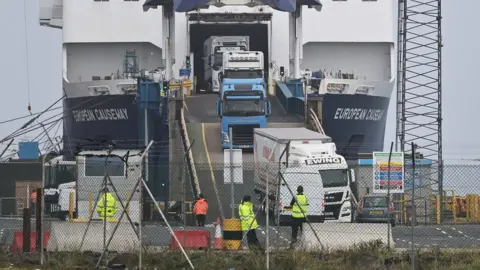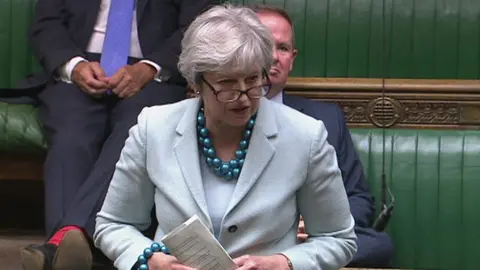Move to override Brexit deal gets initial backing from MPs
 Getty Images
Getty ImagesGovernment plans to override parts of the Brexit deal relating to Northern Ireland have passed their first hurdle in Parliament.
By 295 votes to 221, MPs gave initial approval to a controversial bill allowing ministers to scrap parts of the Northern Ireland Protocol.
It comes despite warnings, including from former PM Theresa May, that it breaches international law.
The move also risks fresh tensions with the EU, which has taken legal action.
But Foreign Secretary Liz Truss said there was no other option to "fix" problems the deal has created.
The bill would allow ministers to change the part of 2019 deal that introduced post-Brexit checks on goods sent from Great Britain to Northern Ireland.
Those were designed to avoid checks at the UK's border with the Republic of Ireland, but they are highly unpopular among unionists in Northern Ireland.
The bill began its journey through Parliament on Monday, with MPs voting to give it initial approval and allowing it to progress for further scrutiny.
The government won the vote with a majority of 74, with Northern Ireland's Democratic Unionist Party (DUP) MPs supporting the bill.
Voting lists showed no Conservative MPs voted against the bill. However during the debate, some joined opposition MPs in warning that the legislation breaches international law.
Ms Truss argued the bill was justified because the EU had not shown enough "flexibility" during negotiations change the relevant part of the 2019 deal, known as the Northern Ireland Protocol.
'No other choice'
She told MPs that ministers expected the passing of the bill to lead to the resumption of power-sharing in Northern Ireland, which has been put on hold since May's assembly elections.
Nationalist party Sinn Féin won the most seats in May's elections, but the DUP, which came second, is refusing to re-enter a power-sharing executive until its concerns about the protocol are addressed.
Speaking to reporters earlier, DUP leader Sir Jeffrey Donaldson said the party would "consider what steps we can take" in terms of returning, if the bill gets through all its Commons stages intact.
Speaking in favour of the bill during the Commons debate, he said the protocol had had a "devastating impact" on Northern Ireland.
Ms Truss added that the bill was justified by the "worsening situation" in Northern Ireland, and the UK had been left with "no other choice" because the EU had ruled out changes to the text of the 2019 agreement the UK had signed.
She added that the move was legal because changes to the protocol were required to preserve Northern Ireland's 1998 Belfast/Good Friday peace agreement.
 House of Commons
House of CommonsHowever, Ms May - who as prime minister started Brexit negotiations in 2017 before quitting in 2019 after failing to get her exit deal passed in Parliament - said the bill would fail to achieve its aims.
She questioned the argument that a legal principle of necessity allows for the government's plans, saying: "Necessity suggests urgent... There is nothing urgent about this bill.
"It has not been introduced as emergency legislation. It's likely to take not weeks but months to get through Parliament."
She said she had concluded it was "not legal", and would "diminish the standing of the United Kingdom in the eyes of the world".
She told MPs she "cannot support" the plans. Voting lists show she did not take part in the vote, suggesting she may have abstained.
Fellow Tory Simon Hoare, who chairs the Commons Northern Ireland Committee, said the bill represented "playing fast and loose with our international reputation" - whilst former Tory international development secretary Andrew Mitchell said it "brazenly breaks" the UK's obligations.
Parliamentary road ahead
Labour opposed the bill, with shadow foreign secretary David Lammy saying it would alienate the UK's allies, and risk a trade war with the EU during a cost-of-living crisis.
Although stating that the EU had been "too rigid as well," he said it would be better for the UK to continue negotiations with the EU.
Earlier, Prime Minister Boris Johnson said he believed the bill on the Northern Ireland Protocol could be passed by the end of the year.
Speaking to the BBC at the G7 summit in Germany, Mr Johnson said the government's plan could be carried out "fairly rapidly".
The government is aiming to fast-track the bill through the House of Commons before the summer recess in mid-July.
It is expected to face stern opposition in the House of Lords, however - with Mr Hoare predicting it could take until next spring to get it through Parliament.
The bill has also prompted a backlash from the EU, which said it would be restarting legal action against the UK after the legislation was published.

What is the Northern Ireland Protocol?
- The Northern Ireland Protocol is part of the Brexit deal: it means lorries don't face checkpoints when they go from Northern Ireland (in the UK) to the Republic of Ireland (in the EU)
- Instead, when goods arrive in Northern Ireland from the rest of the UK (England, Scotland and Wales), they are checked against EU rules
- The UK and the EU chose this arrangement because the Irish border is a sensitive issue due to Northern Ireland's troubled political history
Read more: A simple guide to the Brexit border problem


